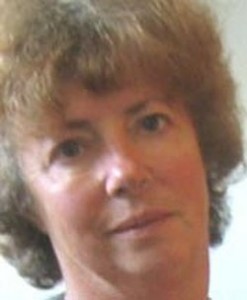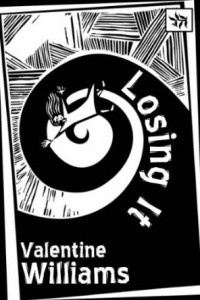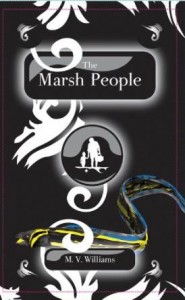You have written many novels, including The Marsh People, The Poison Garden of Dorelia Jones, and a collection of short stories called Unconfirmed Reports From Out There. Your novel Losing It is about redemption, you say, and the dilemmas society faces in ‘treating’ people we have deemed mad or bad, or both. Can you tell us a bit about the ideas behind it?
I wrote Losing It following a training session and discussions with staff from a secure psychiatric hospital. I had worked as a psychotherapist in different settings and it always seemed to me that there was an irresolvable problem at the heart of any ‘treatment’ for people judged by the courts to have committed acts of murder and violence against others, but having ‘diminished responsibility’ for their actions. If, being held securely somewhere and unable to act out their violent impulses, they realise the full horror of what they’ve done, they are then often unable to carry on living. The only available victim is themself, and suicide is often an outcome – Fred West is a case in point. What struck me was the fact that becoming ‘sane’ would be likely to drive them to self destruct, as they could no longer live with themselves.
The staff I met were caring, understanding individuals who acknowledged the humanity of their patients and did their best to care for them. They thought therapeutic intervention sometimes did more harm than good, as it uncovered disturbing material and the patient and staff then had to deal with the consequences and it had a destabilising effect all round. The patients could not undo their criminal actions and often there was no means of making any sort of reparation. Jane cannot move on from her actions; she’s trapped with the reality and enormity of her past deeds.
People deemed to have personality disorders are not mad in the clinical sense, and we don’t have effective ways of treating them, at least not ones we’re prepared to fund. Psychopaths exist in and out of institutions. ‘The Army welcomes fit young psychopaths’ a psychologist told me recently. ‘They do well in the S.A.S especially.’ However, I know from working with distressed young ex soldiers, that to carry out some orders they had to become numb and hardened to the effects of their actions on others, ie. psychopathic, but removed from that situation they often experience a collapse, from which, if they get the right help, they can recover. A diagnosable mental illness, such as schizophrenia, poses a different set of problems.
In Losing It, Jane has unwelcome flashbacks, but it is only by going back and understanding the reality of what has happened that she connects with the emotional content of it, and with her own sad childhood. I wrote it as a first person narrative, and there were times when I had to withdraw and have a break from it. Mad or bad? This question may never be satisfactorily answered.
Your collection Shark Wrestling For Beginners contains some wonderful poems, the preface of which is: Holding on to the dangerous, slippery elements that make us human is like wrestling with sharks. You will need assistance and you may get hurt. Can you give us an extract from one of the poems and talk us through it?
In Shark Wrestling for Beginners, the poem titled DAMAGED, which won the Hippocrates Prize three years ago, was an attempt to focus on the vulnerability of a baby, possibly with Down’s Syndrome, but stressing the human need of this infant to be held and cuddled and loved. I worked for a while in a children’s hospital and I often walked past the baby unit and felt the urge to comfort these tiny beings. Babies with Trisomy, or Downs’ Syndrome, often have problems with their tongues and find it hard to articulate clearly. Stone, plum and tongue have a sound that replicates these efforts. The ‘lips that stayed blue’ is a reference to the baby’s poor circulation. I wanted the effect of those lines to give the reader a sense of seeing the baby for the first time and noting his appearance.
Here’s the poem:
DAMAGED
He had a stone where his mouth should be,
a tongue filled with a plum,
lips that stayed blue with the effort
of being born.
In the next stanza, I wanted to look past the ‘damage’ to the real child, who smiles and waves his fingers at the nurse. The word ‘fishes’ came into my head as something alive and squirming, connecting tears and laughter. We look past the ‘damage’ and see the tiny human infant trying to make contact with the world.
But when he laughed, later,
the world came alive and fishes swam
out of his eyes across the room
as he waved his stubby fingers at the nurse.
In the third stanza we’re taking another look, this time at his needs and at the basic frustration and repetitive actions- head banging- that this small child comforts himself with. Autistic children often do this, but I wanted the poem to be more general, about the needs all children have for stimulation, comfort and love. The word ‘butt’ conveys several meanings, deliberately, and the alliteration in ‘cracks and connects’ adds emphasis to the rocking, which is interrupted by ‘poor kid’. We look at him, then look away. The last three words, staccatto-like, are the essence of what he needs, namely attention.
He doesn’t know the time;
only that he’s hungry
and his head hurts.
The butt of many butts,
it cracks and connects,
poor kid,
too many times.
He.
Me.
Want.
I toyed with other endings for the poem, including ‘cuddle me’ but in the end decided I would leave it open, since he can’t articulate what he wants. I had problems with the title, too, giving the child a name in the process – Simon. But I wanted it to be unspecific and about all the children who are born damaged in some way and whose human needs are overlooked at times.
The panel of judges felt it focussed on the humanity of the child, rather than the child-as-patient. I was pleased they recognised this.
What do you care about? What themes keep cropping up in your writing?
I care very much about children. We have three, plus a young man who came to us for the weekend aged sixteen and stayed for seven years. They’re all adult now. I’ve written about being a foster parent, about people experiencing mental health problems and about social issues and injustices, though this is cunningly disguised as poetry or fiction, or as humour.
I care about solitude, stillness and wild places. Mindfulness is something I embrace. I care about mankind’s ability to mess things up or get things right, and I have a curiosity about other people and the wider world which has given me privileged insights into people from many different cultures. For this reason I love art, world cinema and music, travelling in out of the way places, and multi-cultural events. I have firm political convictions about equality, human rights and how we need one another to survive. The Marsh People takes this as a theme. It’s a dystopian narrative based on an experiment carried out with dogs kept in wire cages, who were fed, watered, then later offered an escape route, though this meant getting an electric shock. Most dogs unsurprisingly stayed where they were, but a few saw their chance to escape and despite not knowing what lay ahead, jumped out and found freedom. I applied this experiment to humans in a City, feeling that some of us have the ability to seize the day, while others are unable to.
Everyone has a story to tell. Sometimes I’ve been lucky enough to hear it. We can deal with other peoples’ stories in several ways: by allowing ourselves to be affected by them, by showing them to the world in the form of a story or a poem or by blocking our ears. Listening and acting on what we discover is often, I think, like wrestling with sharks.
You wrote two self help books after completing an MA at Edge Hill. How did you move on to poetry? Is it something you have always been interested in, or did it just develop?
I’ve always written poetry, since I could remember. My mother was very deaf, but liked to recite poetry and Shakespeare to us. She paid me a penny for every verse of The Ancient Mariner I could remember – I think I got to twelve – and entered me for verse speaking competitions.
The commissioned self-help books I wrote after my MA were based on my work as a psychotherapist, but before that I trained as a teacher and was lucky enough to have Alan Brownjohn and Martin Bell as English tutors. They encouraged me to write more poetry. I had some work published in poetry magazines and just kept going.
What is your creative space like? Do you write in one place?
My creative space is a cramped office which doubles as an extra bedroom, but it has my computer, reference books and filing cabinets. I have stacks of notebooks which I carry with me to jot things down and raid these for ideas and details. I stay off the internet when I’m working, as it provides too many distractions, but allow myself a limited window at the end of the day to read emails and make use of social media, though I’m not good at that.
Who has inspired you as a writer and why?
Writers who have inspired me recently are E Annie Proulx, Sebastian Faulks, Barbara Kingsolver, Richard Flanagan and Kazuo Ishiguro, for the inventiveness and originality of their writing. I also read a lot of non fiction, poetry and magazines. Private Eye is essential.
I read Clive James’ column in the Guardian and a mix of political comment, reviews and articles in whatever publication comes my way. Being eclectic and wide ranging in what I read has helped me broaden my vocabulary – I wrote a poem once about a scaffolder because I’d picked up a manual with hundreds of scaffolding terms in it and found the language intriguing, I like to learn something as I read, and something new is always appealing.
A simple phrase can start a train of thought and like pulling a piece of string, writing is born from it. The Greeks have an expression: ‘Slowly, the cabbages.’ When I learned how to say this in Greek recently all sorts of ideas for a short story came into my mind. It’s stewing away in my mind now and when it’s almost cooked I’ll get it out and work on it. Another phrase that set me off was the old Cotswold dialect word ‘mooncalf’, meaning a thing half-formed. I’m beginning to realise that the vulnerability of young life is a pretty constant theme in my books and poems!
What is next for you? Have you any plans?
I have a number of projects at present that I need to complete. One is to rewrite a historical work I’ve completed for young readers about a travelling menagerie in Victorian England. It’s provisionally titled What Happened to Selina Smith and it’s based on real events. Having had several rejection slips, I had a sudden inspiration that it needed to be a first person narrative.
Then there’s a book about triangular relationships, The Book Of Threes, which I wrote as a comic strip way back when I was working as a psychotherapist. Several publishers were interested but it didn’t come to anything. I feel its time has come.
Lastly, I am 70,000 words into a novel about the Ndrangheda, a branch of the Mafia, but I’ve got stuck at the point where the chief character has been kidnapped. How on earth am I going to write a convincing escape for her? I’m off to London to read at the launch of Lunar’s new poetry press. Perhaps inspiration will come while I’m on the train. I have my notebook just in case!
Check out the links below and get your own copies 🙂



